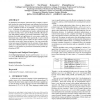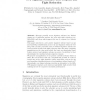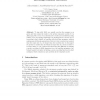1562 search results - page 180 / 313 » Mathematics, Cryptology, Security |
CCS
2010
ACM
14 years 3 months ago
2010
ACM
In distributed environments, statements from a number of principals, besides the central trusted party, may influence the derivations of authorization decisions. However, existin...
FSE
2009
Springer
14 years 8 months ago
2009
Springer
Message Authentication Codes (MACs) are core algorithms deployed in virtually every security protocol in common usage. In these protocols, the integrity and authenticity of messag...
ACNS
2005
Springer
14 years 1 months ago
2005
Springer
Amongst provably secure signature schemes, two distinct classes are of particular interest: the ones with tight reduction (e.g., RSA-PSS), and those which support the use of coupon...
CRYPTO
2005
Springer
14 years 1 months ago
2005
Springer
Forgery and counterfeiting are emerging as serious security risks in low-cost pervasive computing devices. These devices lack the computational, storage, power, and communication r...
PKC
2005
Springer
14 years 1 months ago
2005
Springer
To sign with RSA, one usually encodes the message m as µ(m) and then raises the result to the private exponent modulo N. In Asiacrypt 2000, Coron et al. showed how to build a secu...



